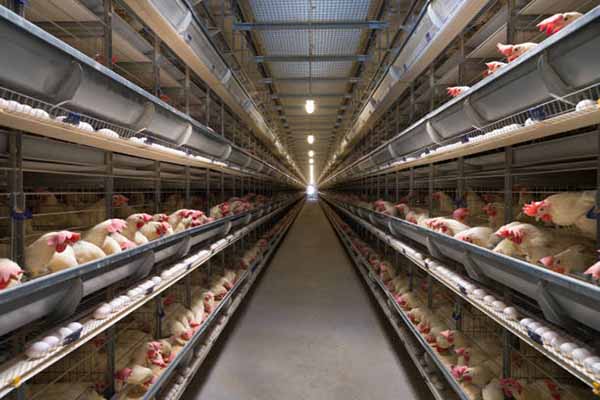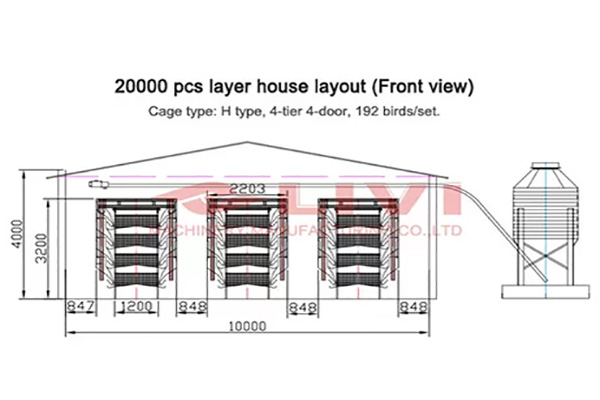Automated Solution for Manure Treatment in Tanzania Chicken Farms
Time : 2025-06-27
In the ever-evolving agricultural landscape of Tanzania, chicken farming has gained significant traction due to its profitability and sustainability. However, with the increased number of chicken farms comes the challenge of manure treatment, which is crucial for maintaining environmental health and farm productivity. This article delves into an automated solution for manure treatment in Tanzania’s chicken farms, focusing on the implementation of advanced poultry equipment for efficient waste management.
Introduction to Manure Treatment in Chicken Farms
Chicken manure is a highly fertile material, but it can also pose serious environmental and health risks if not managed properly. When chicken manure decomposes, it releases ammonia, methane, and other harmful gases into the atmosphere, contributing to air and water pollution. Moreover, if left untreated, it can contaminate soil and water sources, potentially leading to the spread of diseases.
Current Challenges in Manure Treatment in Tanzania Chicken Farms
Traditional manure treatment methods, such as pile composting, often result in poor decomposition rates, high nutrient loss, and considerable labor input. Furthermore, these methods are subject to seasonal variations, which can hinder the treatment process. Tanzania’s chicken farmers have been struggling to find a cost-effective, efficient, and sustainable manure treatment solution.

Lack of Awareness and Training
A significant factor contributing to the poor manure treatment practices in Tanzania is the lack of awareness and training among farmers. Many farmers are not well-informed about the negative impacts of untreated manure and the benefits of proper treatment methods. As a result, they often opt for the least expensive and simplest methods, which do not guarantee effective treatment.
Insufficient Access to Manure Treatment Technologies
In addition to the lack of awareness, the limited availability of modern manure treatment technologies has further complicated the situation. Advanced poultry equipment for manure treatment is often expensive and requires specialized knowledge and skills to operate and maintain. This has made it difficult for small-scale chicken farmers to implement efficient manure treatment systems.
The Automated Solution: Key Components
Recognizing the urgent need for a more efficient and sustainable manure treatment solution, agricultural experts have developed an automated system specifically tailored for Tanzania’s chicken farms. This system combines advanced poultry equipment and modern technology to ensure the effective treatment and recycling of chicken manure.
1. Manure Separation System
The automated solution starts with a manure separation system, which separates chicken manure from solid waste and water. This is achieved through the use of advanced poultry equipment, such as a slatted floor system or a manure belt conveyor, which guides the manure away from the chicken housing area and into the treatment facility.
2. Solid-Waste Composting Unit
Once separated, the solid waste is processed in a composting unit. This unit utilizes a combination of mechanical, thermal, and aerobic processes to accelerate the composting process, ensuring that pathogens and harmful bacteria are effectively destroyed. The composting unit can be designed to accommodate various composting techniques, such as static pile, windrow, or tunnel composting, depending on the farm’s specific requirements.
3. Liquid-Waste Anaerobic Digestion System
The liquid waste, which includes urine and moisture from the manure, is treated using an anaerobic digestion system. This process breaks down the waste into biogas, which can be used as an energy source, and a digestate that is rich in nutrients. The biogas can be captured and used to power a generator, providing electricity for the farm or local community. The digestate can then be applied as a nutrient-rich fertilizer to the farm’s fields.
Implementation and Monitoring
Implementing the automated manure treatment system requires a well-thou ght-out plan and a team of skilled professionals. The following steps outline the process of implementation and monitoring:
ght-out plan and a team of skilled professionals. The following steps outline the process of implementation and monitoring:
1. Feasibility Study and Site Selection
The first step is to conduct a feasibility study to determine whether the automated solution is suitable for the farm. This involves assessing factors such as land availability, water supply, and energy sources. Once the feasibility study is complete, a suitable site for the treatment facility can be selected.
2. Design and Construction
The next step is to design the treatment facility, taking into account the specific requirements of the farm and the chosen technology. Once the design is approved, construction can begin. This may involve the installation of various poultry equipment, such as separators, composting units, and anaerobic digesters.
3. Training and Operation
Proper training of farm staff is crucial for the successful operation of the automated manure treatment system. This training should cover the correct use of poultry equipment, maintenance procedures, and safety measures. Regular monitoring and evaluation of the system’s performance are also essential to ensure its efficiency and sustainability.
Benefits of the Automated Solution
The implementation of the automated manure treatment system in Tanzania’s chicken farms offers numerous benefits, including:
- Reduced air and water pollution
- Increased productivity and profitability
- Energy conservation and sustainability
- Job creation and economic growth
Conclusion
In conclusion, the automated solution for manure treatment in Tanzania’s chicken farms is a significant step towards sustainable agriculture and environmental stewardship. By utilizing advanced poultry equipment and modern technology, this solution effectively addresses the challenges faced by farmers in treating chicken manure. With proper implementation and continuous monitoring, the automated system can contribute to the development of a more productive, efficient, and environmentally friendly chicken farming industry in Tanzania.












